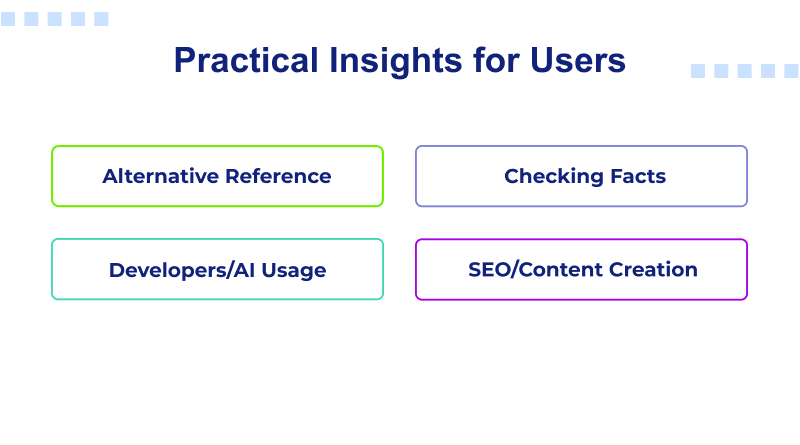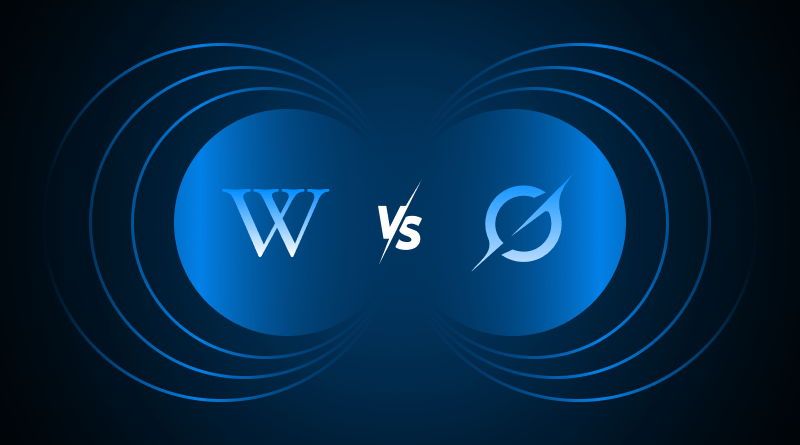There is a new online encyclopedia, designed by AI. Introducing Grokipedia, Elon Musk’s rival to Wikipedia, a self-learning, AI-derived repository of information that claims to “fix bias” and characterize “truth” itself. Can algorithms outsmart millions of human editors?
This post will cover what Grokipedia is and how it compares factors such as reliability, article count, editorial approach, AI vs. human editing, etc. If you’re curious to know about “Grokipedia vs Wikipedia”, “Elon Musk Wikipedia competitor”, “AI-generated encyclopedia,” “What is Grokipedia”, “Grokipedia vs Wikipedia reliability”, “AI vs. human-edited encyclopedia”, or AI website builder, then you’ll find all these explored here in depth.
Table Of Content
Understanding What Is Grokipedia?
To comprehend Grokipedia vs Wikipedia, we first need to understand what Grokipedia is and its origin.
Grokipedia is an online, AI-generated encyclopedia developed by Elon Musk’s AI company xAI. Musk revealed the venture and announced they were creating it as a “Wikipedia competitor” and “a significant improvement over Wikipedia.”
It was launched to the public on 10/27/25 and is currently in version 0.1 on the web.
So when you search “What is Grokipedia,” it’s a new AI-based encyclopedia platform meant to compete with Wikipedia.
Main features:
- Best AI content generator (the Grok LLM), and users can suggest edits rather than making them manually.
- The platform claims to be free and open-source, available to the public with “no limits on use.”
- It explicitly calls itself an alternative model to Wikipedia, in part by criticizing perceived biases by Wikipedia and claiming it has a “truth-seeking” model.
Thus, when discussing “Grokipedia vs Wikipedia”, the user must remember the most fundamental difference: AI vs human-editing.
Wikipedia: Established Encyclopedia Explained
Before we begin our comparison, let’s take a brief look at Wikipedia: the free, online, multilingual encyclopedia, written and maintained by volunteers who are editors, and run by the Wikimedia Foundation.
Noteworthy statistics:
- 64+ million articles in 300+ languages.
- It is human-edited, allows you to track changes made to an article, and is heavily cited.
- It has been under fire over the years for bias, but it’s still one of the most referenced repositories of knowledge online.
In our “Grokipedia vs Wikipedia” analysis, using Wikipedia for comparison is the gold standard.
Grokipedia vs Wikipedia: Article Count and Scale Compared
Grokipedia
At its inception (v 0.1), Grokipedia claimed to have or displayed more than 800,000 articles. On launch day, the site crashed due to heavy traffic; shortly after, it displayed over 885,000 articles on its homepage.
Wikipedia
For the English-language Wikipedia alone, there were over 7 million articles as of early September 2025. Across all languages: tens of millions.
The Comparison
In terms of total volume, Wikipedia still has a much larger article count than Grokipedia in its earliest version. In terms of count alone for the blog keyword “Grokipedia vs Wikipedia,” Wikipedia is crushing it. There is a paper titled “How Similar Are Grokipedia and Wikipedia? A Multi-Dimensional Textual and Structural Comparison,” which found that Grokipedia articles tended to be longer but less lexically diverse, with fewer references per word, and were variable in structural depth compared to Wikipedia.
So: Grokipedia will have fewer articles and those articles will vary in style and depth from Wikipedia (edited by Human individuals). In the frame “Grokipedia vs Wikipedia accuracy”, the references and editorial process will also be a factor.
AI-Powered vs Human-Edited Encyclopedia
One of the main keywords here is: “AI-powered vs human-edited encyclopedia”. This is central to Grokipedia vs Wikipedia.
Wikipedia: Human-Edited
- Articles are written, reviewed, and edited by volunteers from all over the world.
- Because the edits are all transparent (history, talk pages, etc.), oversight and corrections sometimes can occur.
- You must have citations and sources, and community standards help provide trust.
- There remains bias, and yes, there may also be errors, but the editing process is human-designed.
Grokipedia: Powered by AI
- Entries are generated and changed autonomously by the Grok large language model (LLM).
- The initial version does not allow direct human editing in an open-wiki style; users can only propose changes.
- Visibility into the editorial process, model prompts, training data, and fact-checking algorithms would be limited.
- Musk and xAI present Grokipedia as “truth-seeking” through AI; critics similarly note the hallucinatory material, copying of Wikipedia pages, and ideological biases.
So when we say “Grokipedia vs Wikipedia accuracy”, the editorial paradigm shift needs mentioning.
How AI-Powered Grokipedia Creates Content?
Entries in Grokipedia are created and revised by the “Grok” large language model, which is proprietary to xAI. It is said to utilize “massive amounts of inference compute” to analyze sources such as Wikipedia pages. Specifically, it targets to find out “What’s true, partially true, false, or missing.”
The model itself functions by ingesting data and then generating articles, apparently using an internal evaluation or “fact-checking” layer within its system (it also claims to have “fact-checked” its entries). However, how the model’s “fact-checking” works (human review, algorithmic scoring, external citation checks, etc.) is not publicly specified.
Users cannot directly edit articles, but they can flag them or suggest changes via a pop-up form. So, we can see that in the paradigm of AI-writers vs human writers, Grokipedia is more of a large language model-generated platform, whereas Wikipedia is an explicitly human collaboration.
Grokipedia vs Wikipedia: Practical Insights for Users

- Alternative Reference: Grokipedia can offer viewpoints or information consistent with the mainstream paradigm, but you need to apply caution and verification.
- Developers/AI Usage: Grokipedia’s premises for open-use public data and AI generation may help build new functionality (always check licensing).
- Checking Facts: Grokipedia’s early stage and identified issues with bias/accuracy reinforce the value of cross-checking.
- SEO/Content Creation: A competitor has risen in Grokipedia, which comes with increased potential for sources and more noise. Anytime references or links to an encyclopedic entry, facts should have verification to professional criteria.
Grokipedia vs Wikipedia: Making the Right Choice
In the head-to-head comparison between Grokipedia and Wikipedia, there is no clear “winner,” yet they both have their positives and negatives.
Use Wikipedia if you want:
- An established encyclopedia with an enormous number of published articles, and in a variety of languages.
- Transparency in the editorial process, with content moderated by people and with the history documented.
- A relatively more reliable citation, research, and verification source.
- Broad coverage, although sometimes uneven in perspectives and depth.
Use Grokipedia if you want:
- It’s a platform meant to be free, open-use, and big-talking (like “Elon Musk Wikipedia rival”).
- It is a new, AI-fueled encyclopedia that can grow quickly and provide different viewpoints.
- To look at differences in framing or coverage versus Wikipedia (although you need to double-check accuracy).
- If you are interested in fitting into your AI-based workflows, or for novelty and experimentation.
For most content writers, researchers, and general users, Wikipedia is still the safer bet today. In the specific lens of SEO and content creation, if you study Grokipedia vs Wikipedia accuracy, you can discuss that Grokipedia is creating a new paradigm (driven by AI) and is pushing back on Wikipedia’s previous dominance, but the reality is, will it ever provide accuracy and trust at scale?
In the future, Grokipedia’s promise is in hybridization rather than replacement: as a corollary, an AI-powered encyclopedia to help verify facts and summarize content for editorial, journalistic, or pedagogical purposes. If Grokipedia can adopt open auditing, use a well-trained and transparent dataset, and implement verified human moderation, the notion of “neutral knowledge” could take on an entirely new meaning.
FAQs
1. How does Grokipedia’s article count and size compare to Wikipedia’s?
For starters, Grokipedia reportedly has over 800,000 articles at launch, compared to Wikipedia’s roughly 7+ million articles in just the English language, and many more across all 288 languages. Then, with respect to size (i.e., length, references, and structural complexity), Grokipedia articles tend to be longer and cover less lexical diversity. It has fewer references per word compared to articles chosen from Wikipedia.
2. What is the core “bias” criticism directed against Wikipedia?
When comparing Grokipedia to Wikipedia, a major criticism of Wikipedia is that it has systemic ideological and representation bias. Some informants believe the topics or points of view we see are skewed by the framework of the editorial culture, i.e., bias is evident in which articles get created, how we frame topics, and which sources are considered credible. Thus, regarding “Grokipedia vs Wikipedia accuracy”, Grokipedia’s attempt at claiming there is less bias is based on this main criticism.
3. What is the working of content generated by AI on Grokipedia?
The articles are created by the Grok large language model from xAI, which consumes large datasets (including Wikipedia information) to generate encyclopedia articles. Users can not edit entries in the wiki style, but they can suggest edits through a reviewable interface (pop-up forms). The articles are purportedly open-source and free to use by anyone for any purpose.
4. How does Grokipedia manage fact-checking and transparency?
Grokepedia states that it has articles that have “been fact checked by Grok”, the AI model of xAI. However, some articles are extremely similar (or identical) to Wikipedia’s, with fewer citations, raising questions about their provenance and accuracy. Wikipedia has a full edit history, talk pages, open volunteer moderators, open sourcing, and citation policies, so users can see the changes/moderation/debate.















